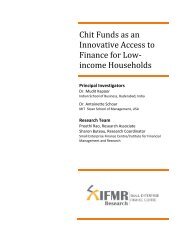Government of India Volume I: Analysis and Recommendations
Government of India Volume I: Analysis and Recommendations
Government of India Volume I: Analysis and Recommendations
Create successful ePaper yourself
Turn your PDF publications into a flip-book with our unique Google optimized e-Paper software.
CHAPTER 9<br />
Systemic risk<br />
9.1. The problem <strong>of</strong> systemic risk<br />
The field <strong>of</strong> financial regulation has traditionally focused on consumer protection, microprudential<br />
regulation <strong>and</strong> resolution. However, the 2008 financial crisis highlighted systemic<br />
risk as another important dimension <strong>of</strong> financial regulatory governance. Subsequently,<br />
governments <strong>and</strong> lawmakers worldwide have pursued regulatory strategies to<br />
avoid such systemic crises <strong>and</strong> reduce the costs to the exchequer, <strong>and</strong> ultimately society,<br />
<strong>of</strong> resolving the crises that do occur.<br />
Systemic risk is the risk <strong>of</strong> a collapse in the functioning <strong>of</strong> the financial system, largely<br />
due to its interconnectedness to other parts <strong>of</strong> the economy, leading to an adverse impact<br />
on the real economy. Thinking about systemic risk oversight requires an integrated<br />
<strong>and</strong> comprehensive view <strong>of</strong> the entire financial system. In comparison, conventional financial<br />
regulation leans towards analysing consumers, financial products, financial firms<br />
or financial markets, one at a time.<br />
The Commission recommends the IMF-FSB-BIS definition <strong>of</strong> systemic risk:<br />
[a] risk <strong>of</strong> disruption to financial services that is caused by an impairment <strong>of</strong> all<br />
or parts <strong>of</strong> the financial system <strong>and</strong> has the potential to have serious negative<br />
consequences for the real economy.<br />
The primary regulatory m<strong>and</strong>ate <strong>of</strong> regulators <strong>and</strong> agencies defines their perspective<br />
<strong>and</strong> information access, so an individual sectoral regulator is likely to focus its gaze or<br />
have a viewpoint on the operations <strong>of</strong> that sector alone, <strong>and</strong> not on the overall financial<br />
system <strong>of</strong> the country. For example, a resolution corporation tends to look at firms from<br />
the narrow perspective <strong>of</strong> how an individual firm would be resolved when in distress <strong>and</strong><br />
this perspective informs its approach to the financial system. Systemic risk analysis, in<br />
contrast, requires a comprehensive system-wide perspective on the impact <strong>of</strong> the failure<br />
<strong>of</strong> an individual firm or sector.<br />
The analysis <strong>of</strong> the Commission regarding systemic risk reflects a combination <strong>of</strong>:<br />
1. <strong>India</strong>’s experiences with several systemic crises from 1992 onwards;<br />
2. The emerging global consensus on methods for avoiding systemic crises that have come into focus after the<br />
2008 financial crisis; <strong>and</strong><br />
3. The analysis <strong>of</strong> scenarios involving potential systemic crises in coming decades in <strong>India</strong>.<br />
To some extent, systemic crises are the manifestation <strong>of</strong> failures in the core tasks <strong>of</strong><br />
financial regulation – consumer protection, micro-prudential regulation <strong>and</strong> resolution.<br />
FINANCIAL SECTOR LEGISLATIVE REFORMS COMMISSION 89



